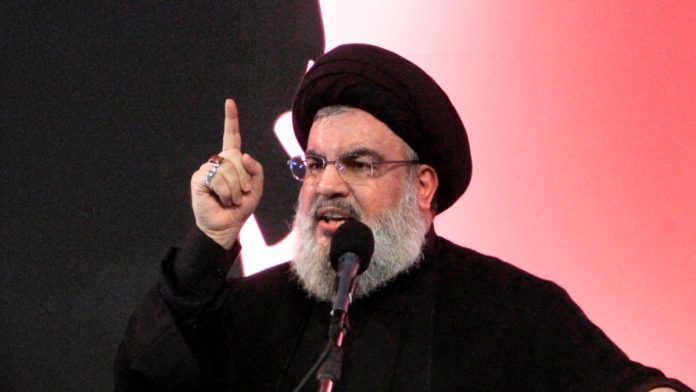In what could be one of the most significant military operations of recent years, reports suggest that Israeli forces have allegedly killed Hezbollah leader Hassan Nasrallah in a targeted precision strike.
If confirmed, this operation marks a pivotal moment in Israel’s ongoing conflict with the Iran-backed Lebanese militia, Hezbollah. With Nasrallah being the face and voice of Hezbollah for decades, the ramifications of his reported assassination are monumental, not only for the geopolitical stability of the region but also for the future of Hezbollah’s operations.
Months of Planning and Intelligence Gathering
Sources close to the Israeli military indicate that this strike was the result of months of careful planning and intelligence operations. Nasrallah, known for his deep mistrust of Western intelligence agencies and Israel’s military capabilities, had reportedly fortified himself in a highly secure bunker system in the southern suburbs of Beirut, known as Dahiyeh, a Hezbollah stronghold. The underground facility, buried approximately 60 feet beneath a densely populated area, was considered virtually impenetrable.
Israel’s success in allegedly breaching these defenses represents a culmination of extensive intelligence work. For months, Israeli operatives and their allies meticulously tracked Nasrallah’s movements, studying his habits and gathering critical data about his underground hideout.
While Israel has neither confirmed nor denied these reports, Prime Minister Benjamin Netanyahu has long been vocal about Israel’s commitment to dismantling Hezbollah’s leadership and neutralizing its military capabilities.
The Strike: Precision at Its Core
According to some reports, the Israeli Air Force (IAF) deployed state-of-the-art bunker-busting bombs to breach the underground command center. These bombs, specifically designed to penetrate deep fortifications, allowed Israeli forces to target Nasrallah while avoiding significant collateral damage to the civilian population above ground.
Multiple sources suggest that more than 80 tons of explosives were utilized in a series of timed detonations, aimed at destroying not only Nasrallah’s bunker but also Hezbollah’s electronic command infrastructure and missile storage.
If Nasrallah was indeed killed in the operation, it would be the first successful strike against the elusive Hezbollah leader, who has survived multiple assassination attempts. Nasrallah’s death would represent a serious blow to Hezbollah’s command structure, which has relied on his leadership to coordinate operations against Israel and maintain internal unity.
Nasrallah: A Longtime Target
Hassan Nasrallah has been on Israel’s radar for decades. Since becoming Hezbollah’s leader in 1992 following the assassination of his predecessor, Abbas al-Musawi, Nasrallah has been a driving force behind the group’s military and political strategies.
His fiery rhetoric, combined with Hezbollah’s military actions against Israeli targets, particularly during the 2006 Lebanon War, made him one of Israel’s most wanted men.
Nasrallah’s leadership has positioned Hezbollah as a formidable non-state actor with significant military capabilities, including an arsenal of rockets capable of reaching deep into Israeli territory. His assassination, if verified, would remove a key figure who has not only been a military strategist but also a symbolic leader for Hezbollah’s resistance against Israel.
The Broader Regional Impact
The alleged assassination of Hassan Nasrallah comes at a time of heightened tensions between Israel and Hezbollah, with both sides engaging in frequent skirmishes along the Israel-Lebanon border. The operation could trigger a new wave of violence, not only between Israel and Hezbollah but also across the broader Middle East, involving Iran, Syria, and other Hezbollah allies.
While Israel has consistently stated that it will continue to target Hezbollah until the group ceases its military activities against the Israeli state, this latest strike could escalate the conflict to a new and dangerous level. Hezbollah, deeply entrenched in Lebanese politics and military infrastructure, will likely seek retaliation if Nasrallah’s death is confirmed. Analysts believe that Hezbollah’s response could range from missile attacks on northern Israel to a wider proxy war involving Iran and other actors in the region.
Moreover, Nasrallah’s death could create a power vacuum within Hezbollah, leading to internal power struggles as the group seeks to appoint a new leader. The absence of Nasrallah’s charismatic leadership might weaken Hezbollah’s cohesion, or conversely, his death could rally the group’s supporters to intensify their opposition to Israel.
International Reaction and Humanitarian Concerns
Internationally, Nasrallah’s assassination will likely draw mixed reactions. While some nations view Hezbollah as a legitimate resistance movement against Israeli occupation, others, like the United States and European Union, classify it as a terrorist organization. U.S. officials have reportedly expressed concern over the potential for escalation, with some claiming they were not briefed on the operation beforehand.
The United Nations has also voiced concerns about the humanitarian impact of the ongoing conflict between Israel and Hezbollah. Recent hostilities have displaced thousands of civilians on both sides of the border, with Lebanese populations, in particular, facing the brunt of the conflict. Humanitarian organizations fear that a full-scale escalation could exacerbate the already dire refugee crisis in Lebanon and lead to further displacement.
A Defining Moment in Middle East Geopolitics
If Hassan Nasrallah’s assassination is confirmed, it will be a defining moment in the Israel-Hezbollah conflict and the broader geopolitics of the Middle East. As the international community watches closely, the coming days will likely reveal Hezbollah’s response, and with it, the potential for further violence. For Israel, the strike, if successful, would be a major military and intelligence victory, removing one of its most determined and dangerous adversaries.
However, it also risks plunging the region into deeper conflict, where the repercussions of this single strike could reverberate for years to come.
Must Read: Netanyahu Warns Iran: ‘No Place Beyond Reach’ After Hassan Nasrallah’s Death






